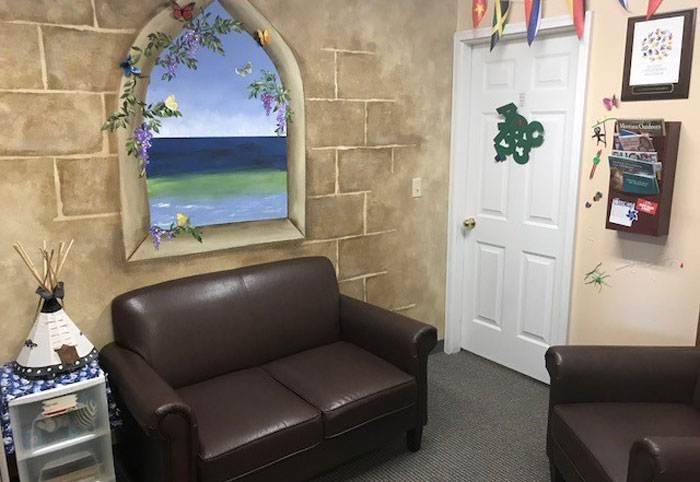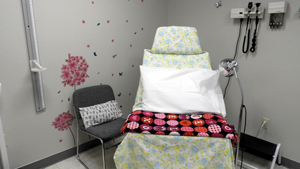Butte Child Evaluation Center
- Need: Before 2000, Butte and southwest Montana had around 1,300 cases of child abuse a year, with only a 20% conviction rate for perpetrators of sexual abuse.
- Intervention: Multiple agencies in the community came together to address the issue of child abuse by forming the Butte Child Evaluation Center (CEC), a Children's Advocacy Center.
- Results: During a 3-year grant cycle, over 200 interviews and exams were performed on victims of sexual abuse and the Butte CEC became the first program in Montana to be accredited by the National Children's Alliance.
Description
Before 2000, the Child and Family Services Division (CFSD) of Butte had an average of 1,300 cases of child abuse a year. They had a low conviction rate for perpetrators of child sexual abuse (around 20%), and there were 220 registered sexual and violent offenders in Butte, a large number for a community of 33,000.
In order to address the issue of child sexual abuse in Butte and southwest Montana, multiple organizations came together under the Southwest Montana Community Health Center to create the Butte Child Evaluation Center (CEC):
- St. James Healthcare
- Head Start
- Early Head Start
- School District #1
- Butte-Silver Bow Law Enforcement
- Silver Bow County attorney's office
The Butte CEC serves as a trauma-informed responsive agency that provides a one-stop shop for victims of child abuse and their non-offending caregiver.
The Center received support from a 2000-2003 Federal Office of Rural Health Policy Rural Health Care Services Outreach grant. Currently, much of the funding comes from the Victims of Crime Act (VOCA) through the Montana Board of Crime Control.

Services offered
The Butte CEC offers several components to address the problem of child abuse:
Public Safety:
- Education of local groups and school administrators on signs of child abuse, interventions by CEC, and mandatory reporting.
- Parent education on child abuse prevention and internet safety.
- Addresses vicarious and secondary trauma in professions that assist victims of trauma.
Clinical Evaluation and Therapy:
- Butte CEC performed forensic interviews and forensic medical exams on suspected victims of abuse including sexual abuse, physical abuse, drug endangered children, witnesses to violence, internet crimes against children, and neglect in a 6-county area.
- On-site trauma therapy for the victim and the non-offending care provider was offered.
- Work closely with CFSD for foster care and transitional planning meetings, specifically with their mental health providers.
A goal of Butte CEC is to provide a place that will take care of all the victim's needs on-site. This limits the amount of times the traumatic experience needs to be recounted for different providers and law-enforcement personnel.
Victim Advocacy

- The Butte CEC provides access to victim advocacy for all children and families that come to the Center.
- The Butte CEC Victim Advocates collaborates with Victim Advocate in the County Attorney's office.
Results
The Butte Center for Child Evaluation has provided:
- Over 200 forensic interviews and exams in 2021
- Increased prosecution rates for perpetrators of sexual abuse in the area
- Increased number of children and families in the community provided with therapy and case management services
- Increased number of children witnessed using safety skills taught in school programs
- 2 satellite clinics, 1 in Anaconda (30 miles from Butte) and 1 in Dillon (60 miles from Butte)
Butte CEC became the first program in Montana to be accredited by the National Children's Alliance. In 2017, the Center received re-accreditation under supervised guidelines. The Center is 1 of 10 Accredited Child Advocacy Centers in Montana. The director serves as the training chair for the Children's Alliance of Montana and works closely with directors from other centers to ensure training needs of the CACs in Montana are met.
In 2017, Dr. Jessie Salisbury, the Butte CEC medical director, received the Outstanding Victim Advocate of the Year Award from the Montana Attorney General's office. She is the first physician to receive this award.
The Montana Standard published the article Karen Sullivan's column: Child Evaluation Center fulfills vital function that explains more about the center.
In 2018, Butte CEC celebrated its 20-year anniversary.
Replication
The Center uses nationally-recognized models and curriculum to guide their practices, which played a part in making it a success. Other sites wishing to replicate this program may be interested in these models. The Butte CEC used:
- Substance Abuse and Mental Health Services Administration (SAMHSA) best practice therapy model for treating trauma including evidence-based assessment, TF-CBT, and PCIT.
- The nationally-recognized personal safety curriculum Talking About Touching. Pricing and training information for this curriculum can be found on the Committee for Children website.
- National Children's Alliance (NCA) standards to develop the Child Evaluation Center.
Butte CEC has been NCA accredited since 2007 and has served as a model to help other child advocacy programs in Montana become accredited.
Former Director Michelle Miller was instrumental in bringing evidenced-based care to the state and, in doing so, has made Butte CEC a success. She is now working for the National Children's Alliance coordinating mental health projects for NCA.
Contact Information
Jamie VanderLinden, Director of Behavioral Health and the Butte Child Evaluation CenterSouthwest Montana Community Health Center
406.496.6002
jvanderlinden@swmtchc.org
Topics
Abuse and violence
Children and youth
Mental health
Schools
Trauma-informed care
States served
Montana
Date added
May 14, 2009
Date updated or reviewed
August 19, 2022
Suggested citation: Rural Health Information Hub, 2022. Butte Child Evaluation Center [online]. Rural Health Information Hub. Available at: https://www.ruralhealthinfo.org/project-examples/533 [Accessed 26 April 2024]
Please contact the models and innovations contact directly for the most complete and current information about this program. Summaries of models and innovations are provided by RHIhub for your convenience. The programs described are not endorsed by RHIhub or by the Federal Office of Rural Health Policy. Each rural community should consider whether a particular project or approach is a good match for their community’s needs and capacity. While it is sometimes possible to adapt program components to match your resources, keep in mind that changes to the program design may impact results.
